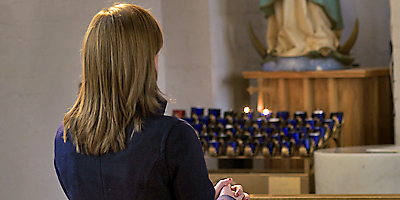
 Now more than ever, the Catholic Church needs women to consider a call to religious life.
Now more than ever, the Catholic Church needs women to consider a call to religious life.
As the population of religious sisters ages, many communities are seeing a declining membership.
But while their numbers decrease, the demand for their services, especially in regard to the poor, continues to climb.
They are wanted in the classroom because of their quality teaching and the strong daily witness they offer students, and Bishop Robert E. Guglielmone has said he would like to develop more roles for women religious in the diocese, particularly in campus ministry.
Families and educators can help nurture vocations by offering encouragement and positive examples to young girls, said Sister Jane Raphael Livingston of the Daughters of St. Paul.
“A vocation often starts with parents who are open to sharing the value of religious life with their children,” Sister Jane said. “We also need to expose young women to … the notion of wanting to give your life in service to others. Offer them role models of saints and other people who served the church, and often that seed of a vocation will be planted at an early age.”
Women should explore different religious communities, and learn about their purposes and missions, said Sister Pamela Smith, who spent several years as director of vocations for the Sisters of Sts. Cyril and Methodius.
“There has to be a very strong attraction to a life of prayer and a life of service and community with other like-minded people, sharing a particular vision or charism,” she said. “You have to have a sense that this is a place God is calling you to be.”
The Internet is a powerful tool for discernment. Most orders now have their own websites, and www.charlestonvocations.com offers a list of all religious serving in the Diocese of Charleston, including contact information.
Women should also pay a personal visit to the communities they consider, said Sister Mary Emily Knapp, vocations director for the Dominican Sisters of St. Cecilia, because they allow women to see whether a community’s daily life and practice is a good fit. Before doing any research, a woman needs to spend a great deal of time in prayer, and be open to hearing God’s call.
“The most important thing is that they not be afraid to take that first step,” Sister Mary Emily said.
